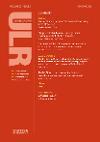Utilities Law Review - Volume 22 - Issue 6

Articles
One for all and all for one?
The General Court ruling in the OPAL case
Dirk Buschle College of Europe, Bruges
Kim Talus Tulane Center for Energy Law
With its judgment of 20 September 2019 the General Court annulled an earlier Commission decision to modify the exemption regime for the OPAL pipeline. The court based its judgment on the principle of energy solidarity introduced by Article 194(1) of the TFEU. The ruling goes against the old adage that only small cases make great law, as the OPAL pipeline has been a major bone of contention in EU energy policy for many years. Given the role and history of legal principles in EU law, the judgment may have a far-reaching impact on the interpretation and application of the rules of EU energy law. This article focuses on one aspect of the OPAL case: the principle of energy solidarity
Merger control and national security: recent developments in the United Kingdom
Stephen Whitfield and Ingrid Rogers
Travers Smith LLP
This article considers recently implemented and proposed further legislative reforms which expand the UK Government’s powers to ‘call in’ and review mergers on national security grounds. The practical approach of the government to scrutinising transactions on national security grounds is also considered in light of recent merger investigations. These cases suggest that the government is willing to investigate a wider range of deals, including minority acquisitions made purely for investment purposes
Dutch tribunal deals blow to collective dominance findings in electronic communications markets
Peter Alexiadis
King’s College, London and Gibson, Dunn & Crutcher LLP
Tim van Helfteren
Tilburg University and King’s College, London
An appeal tribunal has recently overturned the decision of the ACM, the Netherlands’ fused regulatory/competition body, to impose wholesale broadband access obligations on two electronic communications network providers which it considered enjoyed a position of collective dominance or SMP. The ACM made its finding because the two parties held symmetric positions in the relevant Dutch retail market, thereby being likely to align their interests to deny wholesale network access to retail competitors and subsequently raise retail prices. The tribunal’s ruling demonstrates that the hurdle of satisfying the three-pronged legal test in Airtoursis still formidable in a regulatory context, even after recent modifications to European Commission guidance
Case Comments
The EU General Court upholds the EU Commission’s assessment that a Czech renewable energy support scheme involved state resources (FVE Holýšov 1)
Daniel Vasbeck
Baker Botts (Belgium) LLP
In FVE Holýšov 1, the EU General Court upheld the Commission’s assessment that a Czech renewable energy support scheme should be classified as State Aid. The judgment is of interest in that it provides guidance on the interpretation and application of the state resources criterion. Recent cases have highlighted that it can be contentious when renewable energy support schemes meet this criterion, particularly where they are based on state-guaranteed prices.
The UK Network and Information Systems Regulations: are you aware of your obligations?
Rebecca Andersen
Bristows LLP
The author explains that, despite their having been in effect for some time now and the UK Government making it clear that they will apply post-Brexit, there is still a widespread lack of awareness of the United Kingdom’s Network and Information Systems Regulations 2018. She summarises the key take-aways for organisations.
News
Malta.
Paul Micallef
University of Malta
EU Current Survey
Energy – Telecommunications and Digital Economy – Transport – Post
Edited by Peter Alexiadis and Christoph Raab
Gibson, Dunn & Crutcher LLP, Brussels
UK Current Survey
Broadcasting – Energy – Telecommunications and
Digital Economy – Transport
Edited by Philippa Young
Solicitor, Oxford
